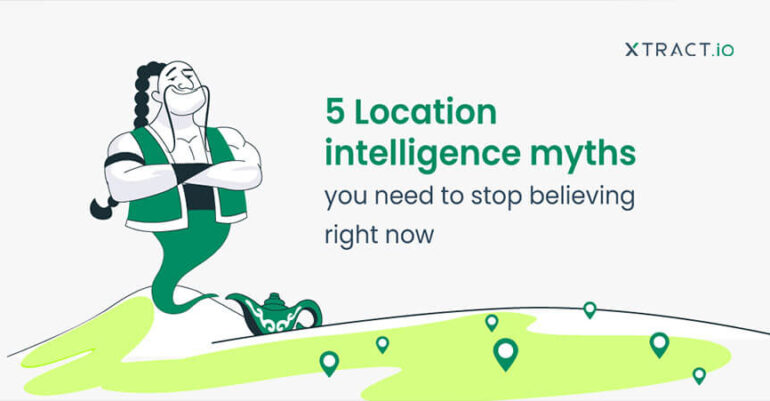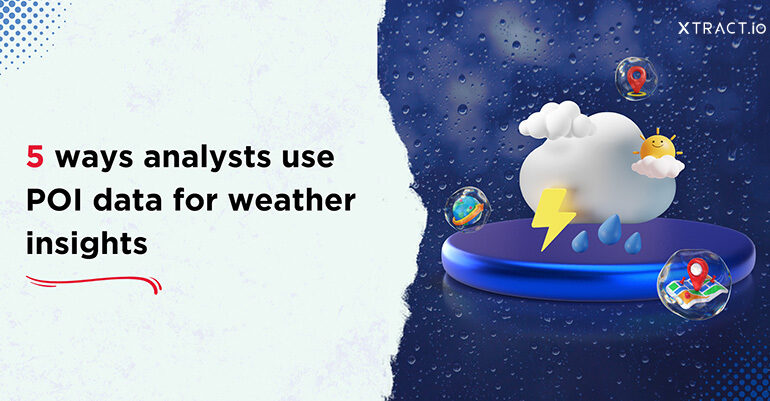The unconventional ways of pitching products based on the location of a prospect has become freakishly common today. When marketers go overboard with the information at their disposal, a lot of doubts begin to creep in.
These doubts about how the location of a user is utilized by marketers, or how expensive is this solution, assumptions on who can use it – begin to spread around quickly. When this happens, the myths become strong beliefs that no one can debunk, whatsoever. If you are holding back on your next move because you believe in one of these, we’re going to try and dispel that today.
This article will help you understand what can be done with location intelligence, the right questions to ask your location intelligence providers, and what you need to stop believing right now. This will also help our fellow location intelligence providers realize why their prospects probably did not understand the project they pitched and the disconnect between the perception of the customers and internal teams.
So, here are the top 5 myths about location intelligence.
Myth #1 Location intelligence is a privacy violation
There’s a lot of debate going on in the Internet about encountering personalized ads based on the location of the user. While most of them conclude it is a privacy breach, there is some in-depth meaning and analysis yet to be discovered in this space.

If you install an app on your mobile or give consent to any marketing communication by checking off the privacy policy, it does mean that as a user, you give consent to the access of your data. But, this happens superficially. As users, we’re impulsive to try new things and most of us do not spend enough time reading the privacy policies. This nature of the user is being taken advantage of and sellers bury sensitive clauses of the privacy information deep down the policy documents.
Location intelligence is not a privacy violation if you are sensitive to the privacy of the user. The location data space is not regulated and the onus lies with the data provider to protect the privacy of the user and exercise control over the kind of data that can be used to personalize the communication and up to what extent.
Myth VS Reality: Access to location data does not necessarily mean privacy breach. It is about having the consent of the user to use their data with explicit privacy policy with no hidden agendas.
Myth #2 Different data points put together is location intelligence
The components of location intelligence may give a slight misconception that it is all about bringing together different data points.
But, the scope and applications of location intelligence are vast and multi-fold. Right from the companies in the shipping industry and petroleum industry to companies like Starbucks and Airbnb, almost all the companies leverage location intelligence to simplify their operations and improve their customer experience.

Be it site planning, demography analysis, logistics planning, customer acquisition, retention or building smart apps for tech giants – the scope of location intelligence is not just data aggregation but intense data crunching, hypotheses, and analyses.
For apps like Uber to function accurately, there are heavy algorithms and analytics running behind. The dynamic pricing, ride request processing, city’s traffic patterns, etc; are processed based on real-time analysis and location-based recommendations.
Myth VS Reality: Combining several data points is only the first step towards building intelligence. Location intelligence is a more complex concept that involves hypotheses, analytics, and insights.
Myth #3 It is too expensive
The complexity of the solutions and the sophistication of the platforms give prospects an idea that location intelligence is a costly affair. But, that’s not the case, really.

Location intelligence is a bundle of solutions that cater to different use cases and industries. Every business is different – their goals, needs, and nature of operations. Depending upon what a business wants to achieve and the scale of growth they are aiming for, the solutions would vary.
The solutions vary from building a complex analytical solution for location-based app development to tracking footfall traffic for a small store in a locality. So, the cost needn’t necessarily be exorbitant as one may assume.
Myth VS Reality: On a broad spectrum, location intelligence seems like a costly affair. But, it can go light on the pocket depending upon the size of your requirement.
Myth #4 It is only for data scientists, analysts and big data experts
The complexity of the concept often raises the question of who this is for. Location intelligence tools and platforms in the present day are highly intuitive and easy to grasp. The data visualization, charts, and other analytics on the dashboard make it easy for even entry-level professionals to draw insights from it.

Location intelligence caters to multiple disciplines and audiences. All of these folks need not necessarily be geo experts or data scientists. Even marketers with basic analytical skills who understand data crunching will be able to make location-based decisions.
Myth VS Reality: Location intelligence seems like a big word that only data scientists can do. But, it is a modest concept that is easily understood and applied by even beginners and neophytes or intermediates.
Myth #5 It’s only for large businesses
It is a common misconception that location intelligence is only for corporate giants like Walmart and Starbucks. Often, the very millennial-like marketing of these cool brands is supported and backed by location intelligence.
With companies realizing the significance of data and analytics for their business, it is becoming increasingly common for companies to also include the location component in their analysis for better decision making.

This misinterpretation often happens because small businesses see location intelligence as a complex solution that can be implemented only by large corporations. But, the truth is that location intelligence is a term that simply combines insights and geospatial information.
Algorithmically, location intelligence = geospatial information + insights.
This geospatial information could be one or all of the following.
POI data, polygon data, real estate data, demographic information, GIS data, maps, geospatial data, and more.
While big companies have massive projects, the scale of the location intelligence solutions would be massive too. For instance, if a big brand like Reebok implements location intelligence for their business, the requirements could be multi-fold.
They may want to start a new store in, say, Nevada for which they would want location intelligence to analyze competition, POI information, polygon intelligence, and more. Similarly, they would have another requirement to personalize their marketing communication by tracking events, footfall traffic, competitor footfall traffic, and other data points.
This is the case for Reebok. But, needn’t be the case for a small business.
A small business faces competition too and needs to win its customers over. Location intelligence can still be deployed at a small scale depending on the nature of the requirement.
Myth VS Reality: If you’re a bigwig or an entrepreneur with a humble startup, location intelligence will help you scale your business to new heights with incredible insights.
Wrapping Up
As providers of location intelligence solutions, the experts at Xtract.io often encounter the above questions from entrepreneurs, marketers, and growth strategists about location intelligence.
As much as they are thrilled about the curiosity of these folks on how location intelligence can transform their businesses, some off-beat questions in this regard seem to be a complete turn-off. Our team of experts shared with us some of the questions that were asked to them and we compiled, classified, and put together some common location intelligence myths.
I hope we’ve helped you break some misconceptions and if this has helped you clear your thoughts, go ahead and kickstart your location intelligence project with Xtract.io!
This article was originally published on Techmediatoday.







